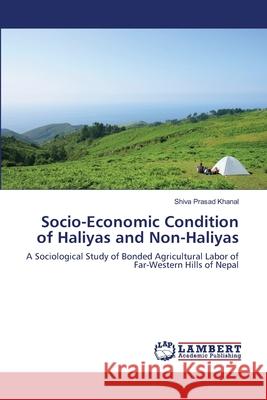Socio-Economic Condition of Haliyas and Non-Haliyas » książka
Socio-Economic Condition of Haliyas and Non-Haliyas
ISBN-13: 9783659490835 / Angielski / Miękka / 2013 / 108 str.
Socio-economic Condition of Haliyas and Non-Haliyas: A Sociological Study of Bonded Agricultural Labor of Western Hills of Nepal is a research book, based on ILO/CDPS survey data. Mr. Khanal explores the nature of deprivation of unfree agricultural labors by critically reviewing the theories and empirical evidences related to social exclusion and caste-based discrimination. This book investigates policy measures for bringing deprived group (Haliyas) into mainstream developments especially with reference to Nepal. It critically examines the extent of differences in socio-economic condition between Haliyas (forced labors who survived within bondage condition) and non-Haliyas (upper caste people) in Far-Western Hills of Nepal. The research design involves descriptive, exploratory as well as comparative. To identify the acute problems of Haliyas the research would provide the academic out-put and policy measures for their betterment and rehabilitation. It will also be useful for development workers, rights-based activists, governmental as well as bilateral, multilateral and non-governmental organizations working to bring mainstreams the disadvantaged and vulnerable groups in Nepal.
Socio-economic Condition of Haliyas and Non-Haliyas: A Sociological Study of Bonded Agricultural Labor of Western Hills of Nepal is a research book, based on ILO/CDPS survey data. Mr. Khanal explores the nature of deprivation of unfree agricultural labors by critically reviewing the theories and empirical evidences related to social exclusion and caste-based discrimination. This book investigates policy measures for bringing deprived group (Haliyas) into mainstream developments especially with reference to Nepal. It critically examines the extent of differences in socio-economic condition between Haliyas (forced labors who survived within bondage condition) and non-Haliyas (upper caste people) in Far-Western Hills of Nepal. The research design involves descriptive, exploratory as well as comparative. To identify the acute problems of Haliyas the research would provide the academic out-put and policy measures for their betterment and rehabilitation. It will also be useful for development workers, rights-based activists, governmental as well as bilateral, multilateral and non-governmental organizations working to bring mainstreams the disadvantaged and vulnerable groups in Nepal.











